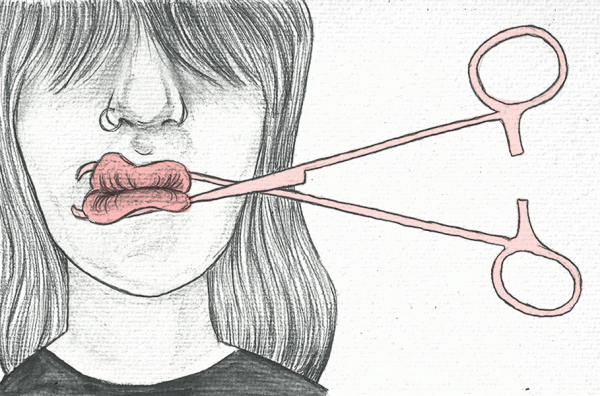Giving Birth with Dignity: No More Obstetric Violence

Obstetric violence leaves a deep mark on those who suffer from it. Giving birth is not just a physical act; it’s loaded with feelings, doubts, and hopes, and it can be a completely unpleasant experience if the woman feels like she’s being treated as nothing more than a vessel carrying contents to be emptied.
Phrases like “don’t shout,” “it’s not that bad,” and “calm down or you’re going to cause something to go wrong” are phrases that treat the woman like a child, make her feel ridiculed and helpless, and invalidate her completely reasonable expression of pain and confusion during a crucial moment in her life.
To be a good medical professional, it’s not enough to have technical knowledge. It also involves treating patients with the respect, empathy, and understanding they deserve, at minimum.
Numerous cutbacks in the health sector produce an increase of objectionable incidents in the doctor-patient relationship. This is because doctors might feel exhausted and overworked, and patients might perceive this as doctors being unsympathetic or disinterested.
Giving birth with dignity and in the care of a respectful professional is not a privilege or a special reward. Giving birth with dignity is a right.
The origin of obstetric violence
Society tells women, almost as an implicit obligation, that they should have children. However, when women face problems related to birth, they’re often not treated the way they should be. This is seen not only in the delivery room, but in all aspects of women’s reproductive health.
It’s not strange that some women feel attracted to other types of care that don’t follow formal medical protocol, since they often feel a lack of control over every important decision in the process of pregnancy and childbirth; even though they run the risk of not receiving the rigorous and specialized medical attention and health guarantees of a hospital.

Women in their thirties who have made a firm decision to not have children and want to want to have their tubes tied are subject to constant interrogation about their private decision concerning their sexual and reproductive life.
If one day they come to regret this decision, that would be something that they would have to deal with and overcome, just like any other decision in life. Impeding other people’s free decisions is oppressive, not advisory.
You would think that the decision to have a baby would be one’s own personal choice. However, women often receive authoritative treatment from their environment, as if they had a reduced capacity for judgment.
Giving birth involves a lot of emotional weight and physical pain
Childbirth is a moment every pregnant woman longs and hopes for. After a pregnancy full of profound physical and psychological changes, the woman wants everything to go smoothly. The thing is that wanting everything to go well is not reduced to simply avoiding any medical complications.
The woman wants to give birth feeling cared for, knowing that her immensely painful contractions are not minimized or ridiculed. We’ve been ingrained with the idea that women have overactive hormones and can’t think for themselves. This idea is untrue; rather it’s a self-fulfilling prophecy. If health workers treat the woman as hysterical from the beginning, she might just end up behaving like that.
Obstetric violence involves denying information, performing unnecessary Cesarean sections, injecting drugs when not applicable, and verbally and physically abusing the pregnant woman before, during, and after childbirth.

If someone notes that they’re being condescended to and treated with disdain, this only increases their frustration and pain. Complaints are a way to defend themselves in response to such inconsiderate and humiliating treatment. While this might seem like an exaggeration, it certainly is not. Many women who suffer from postpartum depression identify the treatment they received by health professionals as a primary stress factor during pregnancy, childbirth, or post-childbirth.
It’s very common for women to feel alone and overwhelmed in their new role as a mother, and for a feeling of emptiness and sadness to overpower them after giving birth. If they receive dehumanizing treatment by health workers, these feelings are accentuated.
They’ve been expecting for months, but nobody warned them that they would suffer such a difficult readjustment process, or that wanting to cry constantly is common and natural. At this point, they might start to feel guilty, and they might even feel deeply misunderstood by their environment. This doesn’t happen in all cases, but it happens frequently enough to be worthy of attention.
The postpartum information provided by medical professionals is a strong asset against the challenges that a woman’s new role as a mother will present. Not properly informing them is a form of indifference and negligence.
Building bridges between women and medical professionals
We’re not saying that receiving warm and empathetic treatment can prevent 100% of the sadness or hopelessness felt during pregnancy, delivery, and postpartum, but it certainly softens and minimizes it. There are many initiatives led by medical professionals and patients who have suffered from obstetric violence to prevent dehumanizing treatment during childbirth.
The various initiatives in Spain include guidelines for normal delivery and care approved by the Ministry of Health or by the Federation of Midwife Associations of Spain (FAME, its acronym in Spanish), as well as the Baby-Friendly Hospital Initiative (BFHI, or IHAN in Spanish) by UNICEF.
There are many health professionals concerned with this subject who do fantastic work in the care and accompaniment of single women, or women and their partners, so that this information isn’t perceived as exclusive, but rather as a necessary condition of dignified treatment in a natural but sometimes contradictory process.
There might be discrepancies or different viewpoints, but with determination and vocation, health workers will know how to provide the proper information to the patient. It’s necessary for the patient to feel like an active part of this important process that will change their life forever. Denouncing obstetric violence does not mean demonizing all health professionals or questioning all their protocols. In fact, it’s quite the opposite.
Denouncing dehumanizing treatment, wanting to give birth with dignity, and wanting to receive good treatment from medical professionals, is simply wanting these professionals to be a positive part of one of the most important moments of one’s life. Being cared for by professionals who don’t just do their job, but do it responsibly, ensures the physical and psychological well-being of the patient.
https://steptohealth.com/7-symptoms-of-endometriosis-need-know/
Obstetric violence leaves a deep mark on those who suffer from it. Giving birth is not just a physical act; it’s loaded with feelings, doubts, and hopes, and it can be a completely unpleasant experience if the woman feels like she’s being treated as nothing more than a vessel carrying contents to be emptied.
Phrases like “don’t shout,” “it’s not that bad,” and “calm down or you’re going to cause something to go wrong” are phrases that treat the woman like a child, make her feel ridiculed and helpless, and invalidate her completely reasonable expression of pain and confusion during a crucial moment in her life.
To be a good medical professional, it’s not enough to have technical knowledge. It also involves treating patients with the respect, empathy, and understanding they deserve, at minimum.
Numerous cutbacks in the health sector produce an increase of objectionable incidents in the doctor-patient relationship. This is because doctors might feel exhausted and overworked, and patients might perceive this as doctors being unsympathetic or disinterested.
Giving birth with dignity and in the care of a respectful professional is not a privilege or a special reward. Giving birth with dignity is a right.
The origin of obstetric violence
Society tells women, almost as an implicit obligation, that they should have children. However, when women face problems related to birth, they’re often not treated the way they should be. This is seen not only in the delivery room, but in all aspects of women’s reproductive health.
It’s not strange that some women feel attracted to other types of care that don’t follow formal medical protocol, since they often feel a lack of control over every important decision in the process of pregnancy and childbirth; even though they run the risk of not receiving the rigorous and specialized medical attention and health guarantees of a hospital.

Women in their thirties who have made a firm decision to not have children and want to want to have their tubes tied are subject to constant interrogation about their private decision concerning their sexual and reproductive life.
If one day they come to regret this decision, that would be something that they would have to deal with and overcome, just like any other decision in life. Impeding other people’s free decisions is oppressive, not advisory.
You would think that the decision to have a baby would be one’s own personal choice. However, women often receive authoritative treatment from their environment, as if they had a reduced capacity for judgment.
Giving birth involves a lot of emotional weight and physical pain
Childbirth is a moment every pregnant woman longs and hopes for. After a pregnancy full of profound physical and psychological changes, the woman wants everything to go smoothly. The thing is that wanting everything to go well is not reduced to simply avoiding any medical complications.
The woman wants to give birth feeling cared for, knowing that her immensely painful contractions are not minimized or ridiculed. We’ve been ingrained with the idea that women have overactive hormones and can’t think for themselves. This idea is untrue; rather it’s a self-fulfilling prophecy. If health workers treat the woman as hysterical from the beginning, she might just end up behaving like that.
Obstetric violence involves denying information, performing unnecessary Cesarean sections, injecting drugs when not applicable, and verbally and physically abusing the pregnant woman before, during, and after childbirth.

If someone notes that they’re being condescended to and treated with disdain, this only increases their frustration and pain. Complaints are a way to defend themselves in response to such inconsiderate and humiliating treatment. While this might seem like an exaggeration, it certainly is not. Many women who suffer from postpartum depression identify the treatment they received by health professionals as a primary stress factor during pregnancy, childbirth, or post-childbirth.
It’s very common for women to feel alone and overwhelmed in their new role as a mother, and for a feeling of emptiness and sadness to overpower them after giving birth. If they receive dehumanizing treatment by health workers, these feelings are accentuated.
They’ve been expecting for months, but nobody warned them that they would suffer such a difficult readjustment process, or that wanting to cry constantly is common and natural. At this point, they might start to feel guilty, and they might even feel deeply misunderstood by their environment. This doesn’t happen in all cases, but it happens frequently enough to be worthy of attention.
The postpartum information provided by medical professionals is a strong asset against the challenges that a woman’s new role as a mother will present. Not properly informing them is a form of indifference and negligence.
Building bridges between women and medical professionals
We’re not saying that receiving warm and empathetic treatment can prevent 100% of the sadness or hopelessness felt during pregnancy, delivery, and postpartum, but it certainly softens and minimizes it. There are many initiatives led by medical professionals and patients who have suffered from obstetric violence to prevent dehumanizing treatment during childbirth.
The various initiatives in Spain include guidelines for normal delivery and care approved by the Ministry of Health or by the Federation of Midwife Associations of Spain (FAME, its acronym in Spanish), as well as the Baby-Friendly Hospital Initiative (BFHI, or IHAN in Spanish) by UNICEF.
There are many health professionals concerned with this subject who do fantastic work in the care and accompaniment of single women, or women and their partners, so that this information isn’t perceived as exclusive, but rather as a necessary condition of dignified treatment in a natural but sometimes contradictory process.
There might be discrepancies or different viewpoints, but with determination and vocation, health workers will know how to provide the proper information to the patient. It’s necessary for the patient to feel like an active part of this important process that will change their life forever. Denouncing obstetric violence does not mean demonizing all health professionals or questioning all their protocols. In fact, it’s quite the opposite.
Denouncing dehumanizing treatment, wanting to give birth with dignity, and wanting to receive good treatment from medical professionals, is simply wanting these professionals to be a positive part of one of the most important moments of one’s life. Being cared for by professionals who don’t just do their job, but do it responsibly, ensures the physical and psychological well-being of the patient.
https://steptohealth.com/7-symptoms-of-endometriosis-need-know/
This text is provided for informational purposes only and does not replace consultation with a professional. If in doubt, consult your specialist.







